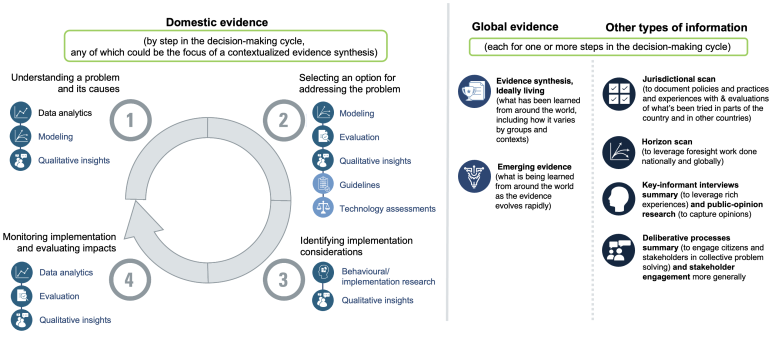
Health system decision-makers work in fast-paced environments where evidence can inform both “big bang” decisions and the thousand-and-one smaller decisions. But too often, the evidence that decision-makers demand either doesn’t reach them on time, isn’t presented in a format appropriate to their needs, or fails to consider the many forms of evidence that are relevant for the issue at hand. What’s more, the evidence often focusses on a single form of evidence (such as data analytics or behavioural/implementation research) as a panacea.
But in the past three years, we’ve seen remarkable efforts to better meet decision makers’ demands for the best evidence under tight timelines. Our work at the Global Commission on Evidence to Address Societal Challenges – a grassroots effort to improve the use of research evidence, both in routine times and in future global crises – has focused on documenting breakthroughs in evidence support and marking the milestones ahead. Following the release of our 2022 foundational report and first annual update (January 2023), we have most recently released our second annual update in January 2024. As noted in Update 2024, there are two innovations showing particular promise for meeting decision-maker evidence needs. The first is ultra-rapid evidence support units and the second is a ‘general contractor’ model.
An ultra-rapid evidence support unit works at the same speed as policy processes, supplying evidence, in its many forms, within days to at most weeks. These units identify best evidence, assess evidence quality, and map existing domestic (or local) and global evidence. The Center for Rapid Evidence Synthesis (ACRES) pioneered such a service – with a primary focus on global evidence – 15 years ago in Uganda. Still today, the ACRES Rapid Evidence Synthesis Unit facilitates access to timely, relevant, and high-quality evidence in response to decision-makers’ urgent needs and demands for policy and decision-making in Uganda. Since then, rapid evidence support units have emerged in many countries, continuing to advance the timeliness, user-centredness and rigour of the methods. The ACRES model alone has been replicated in over 14 countries in Africa, Asia, South America, and North America, with clients ranging from policymakers to nongovernmental organization leaders, business leaders, and more.
Meanwhile, the ‘general contractor’ or ‘builder’ model borrows its name from the same concept used in construction. Just as a homeowner can rely on a general contractor to source the right trades in home renovations, so too can a decision-maker rely on a general contractor to bring in the right evidence trades to build out new evidence – data analytics, modeling, evaluation, behavioural/implementation research, and qualitative insights. The evidence version can then contextualize this local evidence alongside the global evidence (ideally drawn from living evidence syntheses). A natural fit for a general contractor role is to skill up existing ‘trades,’ like evaluators, behavioural/ implementation scientists, librarians and policy analysts.
For those interested in learning more or adopting these approaches, the Global Evidence Commission offers two supportive tools that can help put the right research ingredients together for a given decision-making question:
- a set of ‘prompts’ toward more efficient, systematic, and transparent methods of providing evidence support and
- a ‘matching’ tool for converting a decision-making need into a specific type of question and, having identified the type of question, providing the most suitable methodological approaches to address that question.
In addition, we’ve captured the possible ingredients in delivering timely, demand-driven, equity-sensitive evidence products in Figure 1.
Update 2024 further shows that momentum is building for a step-change improvement in how we use evidence to address societal challenges across our three implementation priorities:
- Formalize and strengthen domestic evidence-support systems
- Enhance and leverage the global evidence architecture
- Put evidence at the center of everyday life
The Global Evidence Commission’s secretariat and Implementation Council – now 76 organizational partners strong (including AcademyHealth), drawn from 18 countries in every part of the world and from many global and regional bodies – welcome new partners to join us in our work. If we want to realize a new normal – just in time evidence for health system decision-making – then we must continue to learn from innovations like rapid evidence support units.